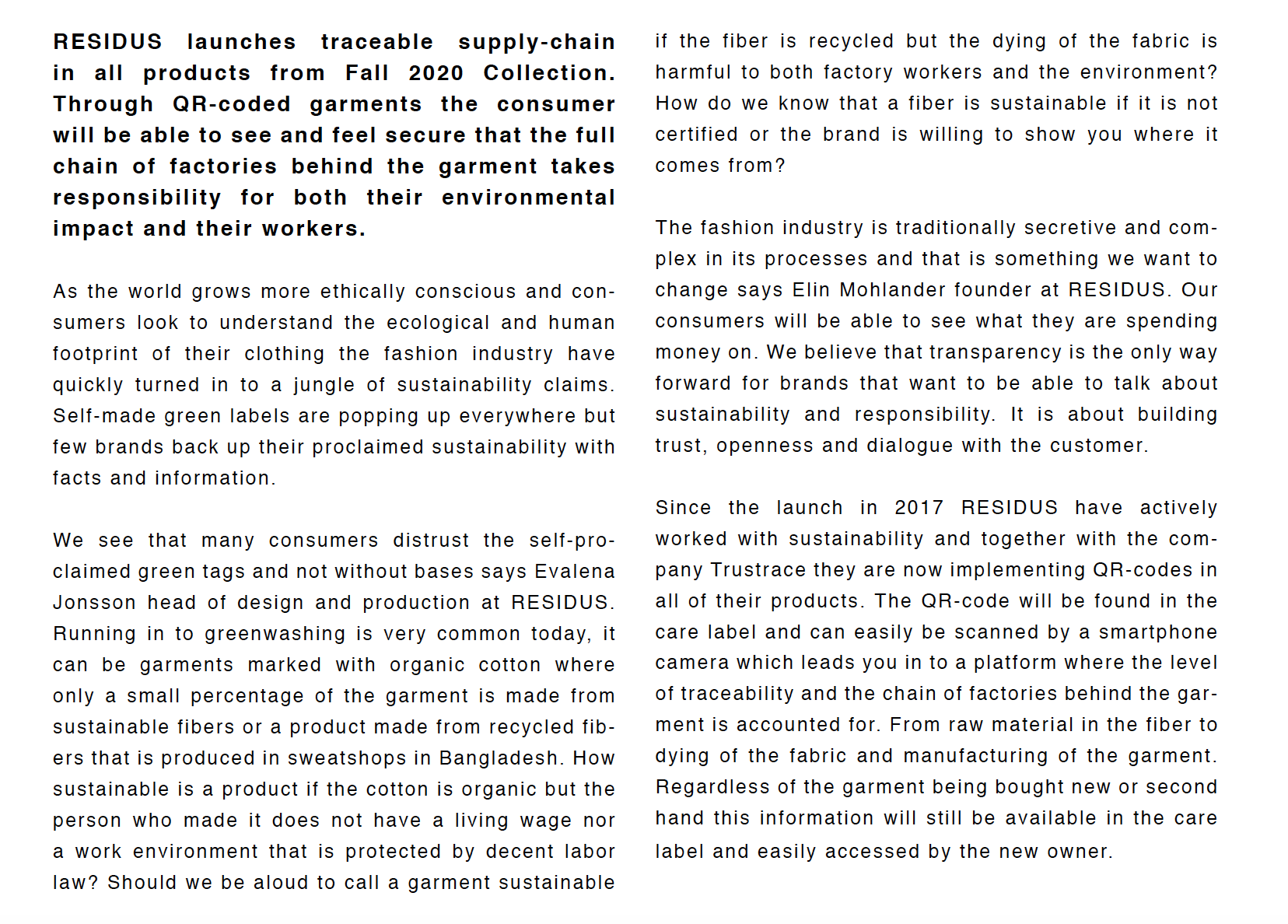
SURPLUS FABRICS
Residus is one of the very few brands that works with surplus fabrics. Surplus textiles come directly from fashion designers and fabric mills and are usually no longer needed for the design it was originally intended for. In order to minimize our carbon footprint, we maximize the life cycle of pre-existing textiles, cut out harmful manufacturing processes, and make limited edition dresses out of fabrics that would otherwise be thrown away.
STANDARD 100 BY OEKO-TEX:
The Standard 100 by OEKO-TEX certification is a worldwide, independent testing system for textile products at all levels of manufacturing. In order to obtain the certification, there are specific standards set for four different categories of garments: garments for babies and toddlers, garments that are close to the skin (like t-shirts and pants), garments away from the skin (like coats and jackets), and decorations and furnishing materials. The certification requires the regulation of harmful chemicals, parameters for the protection of human health, and environmental considerations. All of our manufacturers produce certified OEKO-TEX fabrics, meaning they are clean, healthy, and most of all, environmentally friendly.
ECOVERO™ FABRICS
Residus now uses ECOVERO™ – a certified and eco-friendly viscose fiber – in our garments. Viscose is a plant-based fiber that is not inherently toxic or polluting and is produced using wood from certified sustainable forests. The ECOVERO™ fabric generates up to 50% lower water usage and greenhouse gas emissions compared to generic, commercially produced viscose. Manufactured only from certified and controlled wood sources, eco-friendly viscose provides a great alternative to harmful textiles. ECOVERO™ branded viscose fibers are certified with the internationally recognized EU Ecolabel, which is only awarded to products and services that have a significantly lower environmental impact throughout their lifecycle.
TENCEL
This certified bio-based fiber is manufactured using an environmentally responsible, closed loop production process. The process recycles water and reuses the solvent at a recovery rate of more than 99%! Not only is Tencel amazing to wear but it is also certified as compostable and biodegradable, and thus can fully revert back to nature.
FSC CERTIFIED FIBER
The viscose fiber in this garment is made from FSC certified wood pulp. FSC forest management certification confirms that the woods the fiber originates from is being managed in a way that preserves biological diversity and benefits the lives of local people,
ORGANIC COTTON
The cotton fiber in this garment was grown without using any toxic chemicals or GMOs (genetically modified organisms). Organic cotton does not damage the soil its grown in and uses a whooping 88% less water and 62% less energy then traditional cotton! Its natural production process sustains the health of all ecosystems and people involved. The organic cotton fabric we use is always gots certified.
LINEN
Linen is a super fiber that originates from the earth friendly flax plant. Growing linen requires far less water than growing cotton and it does not acquire any chemicals or fertilizers. Add to thisthat the fabric is amazingly comfortable to wear as well as recyclable.
MADE CLOSE TO HOME
The factory who assemble our garments and the mill who developed the fabric are located in Portugal. That means factories with strong worker unions and carefully controlled chemical processes. Furthermore it means that the garment has never been flown around half the globe but transported over a short distance on efficiently stocked trucks.
ELASTANE
Elastane, or lycra, is a synthetic stretch fiber known for its high elastic capacity. Elastane is never used alone in a garment; as little as two percent of elastane may be enough for the garment to keep its shape better.

